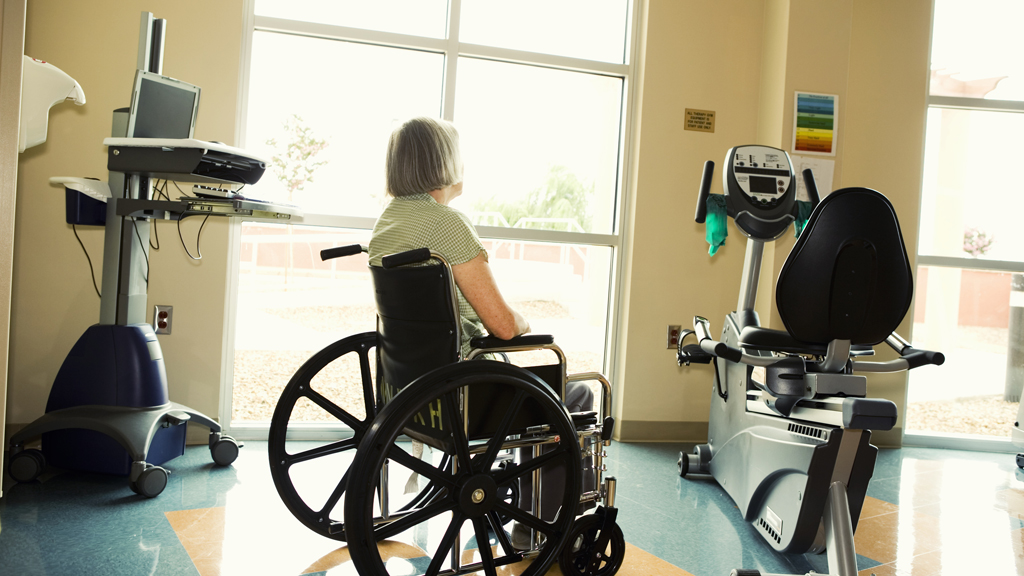No Go Britain: Gyms lack disabled facilities
The Paralympics have inspired many disabled Brits to take up sport, but many gyms remain partly inaccessible, according to campaigners. Channel 4 News hears about the many barriers to exercise.

Many of Britain’s gyms and sporting facilities are out of bounds to disabled people because of a lack of specialist equipment, untrained staff or inaccessible buildings, according to a survey by a disability charity.
One in five gyms surveyed had no working lift while one in three had no suitable equipment for disabled people. Other problems included a lack of hoists at swimming pools to help people in and out of the pool, as well as staff that were unaware of specialist facilities.
One of the main legacy aims of the Paralympic Games is to boost the participation in sport of people with disabilities. Around 18 per cent of Britain’s disabled adults currently take part in some form of physical exercise for 30 minutes a week. However campaigners warn that changes need to be made to increase numbers.
Leonard Cheshire Disability surveyed hundreds of gyms and nearly 1,000 disabled adults throughout the Paralympic Games. While 70 per cent of respondents said they would like to partake in more sport or exercise and nearly half have been inspired by the Paralympics to do so, poor accessibility and expense of joining a gym was a concern.
“What this shows there is a real desire and appetite to get more involved in sport and exercise,” Guy Parckar, Leonard Cheshire Disability’s head of policy and campaigns, told Channel 4 News. “What we need to make sure now, is that accessibility should be there.
“The key thing is that those gyms which aren’t really up scratch realise that there is that market there – there are huge percentages of people who want to get involved.”
Of the 300 private and public gyms surveyed:
- Nearly a third had no automatic door
- At one in five gyms, lifts were not working
- One in four swimming pools did not have a hoist to support disabled people into the water
- 31 per cent of gyms had no suitable equipment for disabled people
“It’s been inspiring to see disabled people on the TV as world class athletes during the Paralympics, but it means nothing if afterwards people can’t use a gym,” said Leonard Cheshire Disability campaigner, Anne Taylor.
“The true legacy of the Paralympics needs to be building a UK where everybody can take part in sport and exercise regardless of ability.”
Treated differently
Sarah Joiner, 52, was advised to start excercising seven years to maintain her ability to walk at all. She has multiple sclerosis and relies on a mobility chair for long distances. She regularly swims 600m and relies on a hoist to be lifted in and out of the water.
Ms Joiner’s local authority-run swimming pool in west London has excellent facilities for its disabled members, including grab rails in changing rooms, flat access and hoists by the pool. But crucially, according to Ms Joiner, staff are always on hand to help, both at reception and by the pool.
But the same cannot be said for the area’s private gym: the lift was out of order for a year and the one disabled changing room is frequently used for storage. “They think: ‘She’s not doing anything, she can wait half an hour while we clean it.'” said Ms Joiner. “Why should we be treated differently to anyone else?”
Sports limbs
Another barrier to exercise for those reliant on prosthetic limbs, can be accessing artificial limbs suitable for sport. Jackie Coventry, a below knee amputee, has three times been refused NHS funding for a sports limb – something she says is essential for her to increase her rate of exercise in order to manage her fibromyalgia and arthritis.
“The Paralympics has inspired me. I do have a lot of back pain and muscle pain and I’m often at the gym thinking I can’t do it, but now I try to push on through,” she told Channel 4 News. “It’s just so frustrating that I could be doing more.”
A sports limb costs around £8,000 but Ms Coventry, 51, says it would make a huge difference to her capacity to exercise.
“With my everyday leg, it looks beautiful, but it’s like putting your foot into a concrete wellington boot,” Ms Coventry added. “When it gets wet then it rubs and can cause discomfort.”
